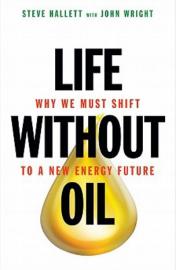 Woe is a country who can’t break its dependence on foreign oil. But how do you make such a bold move when our entire society is built upon its wares? And even more so, how do you break the chains when there are no other alternatives? This are some of the topics discussed in this week’s book, “Life Without Oil: Why We Must Shift To A New Energy Future,” by Steve Hallett with John Wright. Hallett is a professor in the department of Botany and Plant Pathology at Purdue and Wright is an energy and environmental journalist.
Woe is a country who can’t break its dependence on foreign oil. But how do you make such a bold move when our entire society is built upon its wares? And even more so, how do you break the chains when there are no other alternatives? This are some of the topics discussed in this week’s book, “Life Without Oil: Why We Must Shift To A New Energy Future,” by Steve Hallett with John Wright. Hallett is a professor in the department of Botany and Plant Pathology at Purdue and Wright is an energy and environmental journalist.
The premise of the book is that the world is running out of oil while at the same time depleting itself of its natural resources. These two issues can combine to cause destruction and complete collapse of a society. The book begins by highlighting some of the societies that have disappeared due to lack of resources whether it be water or trees or others. One of the most famous case studies he uses is that of Easter Island, now owned by Chile, and the irony that although the people knew their future was in jeopardy due to diminished resources, they used them all anyway. Will this be society today?
Hallett is not a fan of biofuels as a solution to our problems. He also believes renewable energy, such as wind or solar, will only become mainstream when it is the only option. He also doesn’t think we will be laughing 30, 40, 50 years from now about how peak oil and climate change were myths.
In terms of the future energy sources, Hallett believes it will be one in which nuclear and hydrogen play major roles. He says that we need a multitude of effective solutions to the problem of transportation. “…Trains, planes, and automobiles all run on liquid fuels, which are refined directly from oil, and it is extremely difficult to develop versatile transportation systems that use alternative systems. If our new energy model is based on the generation of electricity,  the problem remains of putting this into vehicles. Electric vehicles will play a role, but I believe that the only viable, long-term solution to this problem is hydrogen.”
the problem remains of putting this into vehicles. Electric vehicles will play a role, but I believe that the only viable, long-term solution to this problem is hydrogen.”
He continues, “Hydrogen has as distinct disadvantage that it cannot be simply pumped out of the ground or sucked out of the atmosphere. There is no source of free hydrogen, so first, it has to be made. Hydrogen, then, is not a source of energy at all but merely a carrier of energy. Consequently, the future of energy generation does not rest with hydrogen, but the future of energy delivery might.”
Hallett takes us much beyond oil and forgone society and takes an in-depth look at other issues including agriculture, water, aquaculture and how all of these things intersect. You can’t effect one without effecting the other and often times the consequences are unintended, but happen all the same. While at times his views seem dire and without hope, at the end of the book he lays out a new foundation for the world to move forward. One that is not overpopulated, based on dirty fossil fuels, or over uses natural resources. His world is one where people once again learn how to interact and sustainably live with the land rather than live on the land.

